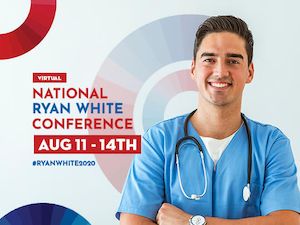
Cross-posted from HIV.gov - Day 1 Recap: 2020 National Ryan White Conference on HIV Care & Treatment - August 12, 2020 - by HRSA's HIV/AIDS Bureau
Note: The Ending the HIV Epidemic initiative was in the spotlight at the opening session of the 2020 National Ryan White Conference. HHS leadership reiterated the administration’s ongoing commitment to the EHE initiative, even as we respond to the COVID-19 pandemic. Also highlighted were the need to address gaps in the implementation of the evidence-based HIV prevention and treatment tools now available, the vital roles that the RWHAP is playing in implementing EHE, and the imperative of addressing racism, homophobia, and stigma if we are to achieve the EHE goals. – Harold J. Phillips, Senior HIV Advisor & Chief Operating Officer, Ending the HIV Epidemic: A Plan for America, HHS Office on Infectious Disease and HIV/AIDS Policy
Nearly 7,500 Ryan White HIV/AIDS Program recipients, subrecipients, national, state and local stakeholders, planning bodies, people with HIV, and providers on the front lines working to deliver direct care to patients came together virtually yesterday to participate in day one of the 2020 Ryan White National Conference on HIV Care & Treatment.
This year's virtual National Conference includes four plenaries, 290 workshops, 41 virtual exhibits, and 160 poster sessions. The theme for the Health Resources and Services Administration- (HRSA) funded and sponsored National Conference is "30 Years of Innovating Care, Optimizing Public Health, Ending the HIV Epidemic." This honors the Ryan White HIV/AIDS Program’s (RWHAP) vital role in the public health response to HIV care and treatment over the last 30 years and highlights the program’s commitment to ending the HIV epidemic in the U.S.
Day 1: Business Meetings
Day 1 began with a series of business meetings with the staff responsible for the administration of the RWHAP’s Parts and initiatives. These sessions highlighted the work of recipients continuing to deliver HIV care and treatment in the context of COVID-19, showcased the work underway to address social justice and racial and socio-economic disparities in the U.S., and honored those who lost their lives to HIV/AIDS.
Opening Plenary: Ending the HIV Epidemic
The opening plenary featured a slate of national leaders in the federal efforts to end the HIV epidemic and to address the COVID-19 pandemic, led by HRSA’s HIV/AIDS Bureau Associate Administrator Dr. Laura Cheever. The federal leaders reviewed the Ryan White HIV/AIDS Program’s key role in the public health response to HIV, policy development, and scientific advances over the last 30 years to advance the effort to end the HIV epidemic.
Dr. Cheever highlighted the program’s impact – sharing that more than half a million people with diagnosed HIV receive RWHAP services each year. And she shared critical history of the program, noting it was created, in part, because of the overwhelming stigma that people with HIV faced within the medical system and the greater society. Dr. Cheever said, “While we have learned much about HIV and have incredible treatments, we continue to benefit from the outstanding care and support services provided by the program, despite the persistence of stigma. We need to address this stigma, homophobia, and racism that persist today if we are going to end the HIV epidemic in the next 10 years.”
Next, HRSA Administrator Tom Engels remarked upon the leadership of the many state and local partners who are focused on providing health services to underserved individuals. Engels reviewed the mission of HRSA, its four goals, and its 90 care programs. Engels also highlighted the most recent COVID-19 funding to support health agencies across the country (e.g., provider claim reimbursement funds, capacity building resources, expanded testing) and HRSA’s role in the Ending the HIV Epidemic initiative. Learn more about HRSA’s COVID-19 efforts.
U.S. Department of Health and Human Services (HHS) Secretary Alex Azar next remarked upon the 30 years of the RWHAP and its viral suppression rates, with 87.1 percent of program clients receiving HIV medical care virally suppressed, which is far above the national average. Azar recommitted HHS to the EHE initiative, even while the agency balances its efforts toward the COVID-19 pandemic. Azar said that RWHAP’s work is crucial to both the implementation of the EHE initiative, as well as confronting stigma related to HIV.
The federal plenary session concluded with a presentation from the National Institutes of Health’s National Institute of Allergy and Infectious Diseases Director Dr. Anthony Fauci, who discussed the research and implementation work necessary to end the HIV epidemic. Dr. Fauci reviewed the current HIV impact in the U.S. and then discussed the scientific progress over the past two years. He shared, “We have the tools” that support treatment and prevention (e.g., combinations of both medical interventions and prevention approaches), but said that there are still implementation gaps to fill: testing, treatment, and stigma. The plan to fill those gaps includes implementing the four pillars (diagnose, treat, prevent, and respond) to reduce new HIV infections by 90 percent by 2030 under the multi-agency EHE initiative. He stressed that we need to focus on the areas of highest HIV vulnerability (black/African Americans, black MSM, youth, and southern states and select counties). In addition, he shared that implementation science, which links data on what works and implement those best practices, is essential. Dr. Fauci said, “We do believe we can end the HIV epidemic in the nation and thus believe we can do so globally.”
Stay Connected to #RyanWhite2020
Want to stay connected to the Virtual 2020 National Ryan White Conference on HIV Care & Treatment? Follow HRSA on Twitter: @HRSAgov. You can also share which sessions you are enjoying – just use the hashtags #RyanWhite2020 and #30YearsofCARE.